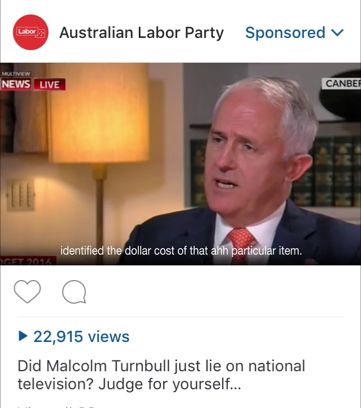
Prime Minister Malcolm Turnbull officially called the election today (Sunday 8 May) which means there is two month-long campaign period ahead. Parliament will be dissolved on Monday (9 May).
A barrage of advertising is expected from the major political parties in the run up to polling, but there are a number of rules and regulations that come into play around advertising in an election period. Social media is likly to play a much bigger role this year than in years gone by as the social landscape is more sophisticated and offers more tools, and more potential eyeballs, for campaign messages. Read this article for how the election may play out on Facebook and Instagram.
Turnbull has already started with back to back ads airing on Nine today (Sunday 8 May). Meanwhile, the Labor party has got in fast with an attack ad on Instagram suggesting Turnbull may have lied on TV.

Here's a few of the rules:
Blackout:
A blackout period is enforced for election advertising and ACMA issues guidelines around broadcasting of political and election matters and the content of electronic communications for broadcasters, political parties and election candidates, advertisers and the general public. Here are some key points:
Clause 3A of Schedule 2 to the Broadcasting Services Act requires that a broadcaster must not broadcast an election advertisement from the end of the Wednesday before the polling day until the close of the poll on polling day. The election advertising blackout only applies to broadcasters. It does not include online services and print media.
Spam:
The Spam Act 2003 prohibits the sending of ‘unsolicited commercial electronic messages’ including email, SMS and MMS messages.
Who is responsible for what?
ACMA is responsible for the regulation of political and election matter in the broadcast media under the Broadcasting Services Act, it is not responsible for making or administering rules about the authorisation of electoral advertisements (this is regulated by the Australian Electoral Commission [AEC]), determining whether an election or political advertisement is misleading or untrue, or dealing with complaints about false or defamatory statements about the personal character or conduct of a candidate. The AEC has responsibility for the regulation of election advertising under the Commonwealth Electoral Act.
Extra advertisements:
Clause 5.3.3 (b) of the code provides that, between 6pm and midnight during an election period, commercial free-to-air networks are allowed to broadcast an additional minute of non-program matter but the additional minute must comprise political matter and the network must provide a summary of all relevant non-program matter to Free TV Australia for public release.
Truth in political advertising:
Unsurprisingly, a wealth of complaints are usually made around election advertising, particularly around the truth and accuracy of ads and misleading claims. The adjudication of complaints about political and election material is outside the charter of the board. Currently, according to the ASB's website, there is no legal requirement for the content of political advertising to be factually correct. It advises complainants to raise their concerns with the advertiser directly and local MPs.
Caretaker phase:
The Government now enters a ‘Caretaker phase’ which means that a number of currently live government advertising campaigns could be pulled. The caretaker guidelines are there so that a sitting Government doesn’t use “Commonwealth resources in a manner to advantage a particular party”.
The department of finance, prime minister and cabinet will review all government advertising campaigns and make recommendations as to whether or not they should continue. To continue the activity needs cross party support.
The current $30 million domestic violence campaign is likely to stay and the $8 million national security campaign, which arrived at the end of April and echoes former PM John Howard’s "Be alert, not alarmed" anti-terrorist message, could be construed as Liberal scaremongering and be halted.
What will the parties campaign on?
In his announcement, Turnbull spoke about the innovation agenda and economic growth. In January it was revealed that Turnbull’s government was investing $28 million in advertising to push the Innovation Agenda – almost matching the largest yearly bill for Defence Recruiting advertising which topped $31.3m during 2014-15. It may be halted during the election period. Incidentally, the Government spent a total $107m was spent on various advertising campaigns in the 2014-15 financial year.
Bill Shorten, the opposition leader also made a speech today. His focus was on positivity and trust. He touched on the themes of education, childcare, healthcare and Medicare, climate change, gender equality.
In the 2013 election, during the five week campaign period between 5 August 6 September The Liberals spent $6.75m on TV, press and radio in metro areas whicle Labor spent $4.04m, according to Ebiquity.
For more on political advertising, the impact social media can have on an election, and a look at some of the all-time greatest political ads from across the globe, check out the next issue of AdNews in print, out 13 May. Subscribe in print, or get it digital on Apple or Android devices through Zinio. Plus, you can still get the iPad edition through iTunes.
Have something to say on this? Share your views in the comments section below. Or if you have a news story or tip-off, drop me a line at rosiebaker@yaffa.com.au
Sign up to the AdNews newsletter, like us on Facebook or follow us on Twitter for breaking stories and campaigns throughout the day. Need a job? Visit adnewsjobs.com.au.


